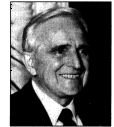Doug Engelbart
Born January 25, 1925, Portland, Ore.; inventor of the mouse and strong Proponent of the Potential for high-performance human augmentation.

Education: BS, electrical engineering, Oregon State University, 1948; PhD, electrical engineering and computer science, University of California, Berkeley, 1957.
Professional Experience: Ames Laboratory, Mountain View, 1948-1951; assistant professor, University of California, Berkeley, 1951-1956; Stanford Research Institute (now SRI International), 1957-1977; senior scientist, Tymshare, Inc., 1977-1984; senior scientist McDonnell Douglas Corporation, 1984-1989; director, Bootstrap Institute, 1989-present.
Honors and Awards: Computer Pioneer Award, IEEE Computer Society, 1992.
Douglas C. Engelbart serves as the director of the Bootstrap Institute, a California corporation which is committed to launching the "bootstrap initiative," a consortium supporting the bootstrap strategy for continuous improvement of organizational capability.
Engelbart was born in Portland, Oregon, on January 25, 1925. He served in the US Navy as an electronics technician during World War II, and received his BS in electrical engineering from Oregon State University in 1948. He worked at the NACA (before it became "NASA") Ames Laboratory until 1951 before going on to earn his PhD in electrical engineering (with a computer specialty) at the University of California, Berkeley. His thesis was on applying plasma phenomena to digital devices. This work resulted in the issuance of a dozen patents.
He stayed on at Berkeley as assistant professor until 1956, when he left for the Stanford Research Institute (now SRI International) where he worked on magnetic computer components, and studied digital device phenomena and miniaturization scaling potential. This work produced another dozen patents.
In 1959 Dr. Engelbart launched the SRI Augmentation Research Center, which he directed until 1977. This center provided him with the opportunity to pioneer the modern interactive working environment, for which he was honored by the presentation of the IEEE Pioneer Award. [From the press release on the occasion of the presentation of the IEEE Computer Society Computer Pioneer Award, 1992.] He used NLS (On-Line System) as an exploratory vehicle for research into the "knowledge worker/organization." Results included the basic patent for the "mouse," development of two-dimensional editing, the concept of windows, cross-file editing, uniform command syntax, remote procedure-call protocol, mixed text-graphic files, structured document files, idea processing, and hypertext, among many more developments. When he left the center, it had some 47 members.
Tymshare bought SRI's commercial rights to NLS, renamed it "Augment," and set it up as a principal line of business of its Office Automation Division. Engelbart became senior scientist of Tymshare until McDonnell Douglas Corp. acquired Tymshare in 1984. He then joined McDonnell in the same position, but working on integrated information-systems architectures and associated evolutionary strategies in its aerospace program. He retired from MDC in 1989, but continued his pursuit of "the augmented knowledge organization," which found a home at Stanford University in the "Bootstrap Project." In 1990 this became the Bootstrap Institute and was incorporated as a separate entity from the university.
UPDATES
Doug Engelbart has also received the following awards: Lemelson-MIT Prize (1997); ACM Turing Award (1997); ACM SIGCHI Lifetime Achievement Award (1998); Benjamin Franklin Medal (1999); U.S. National Medal of Technology (2000); British computer society Lovelace Medal (2001); Fellow of the Computer History Museum (2001). (MRW, 2012)
Douglas Carl Engelbart died on July 2, 2013. (THVV, 2013)
New content Copyright © 2013-2023 by the IEEE Computer Society and the Institute of Electrical and Electronics Engineers Inc.
All rights reserved. This material may not be reproduced or redistributed without the express written permission of the copyright holder.
